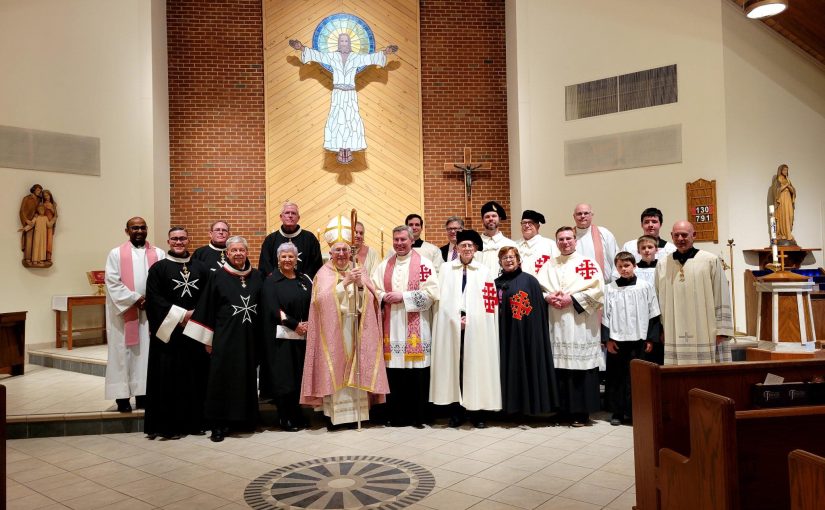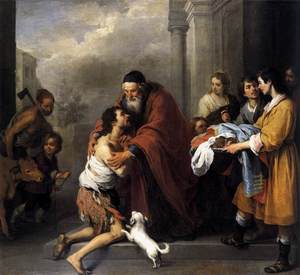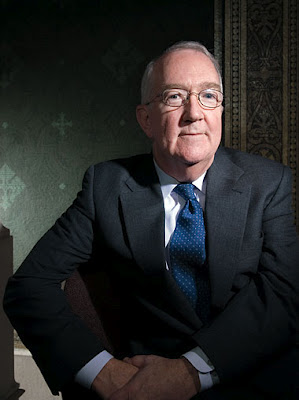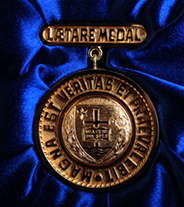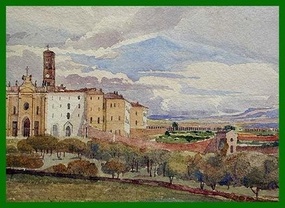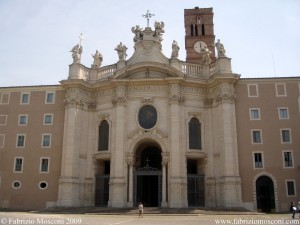 The Fourth Sunday of Lent, Laetare Sunday, has a special remembrance for me. Several years ago I had the privilege to live for a month at Santa Croce in Gerusalemme, Rome, with the Cistercians. Sadly, the Cistercian existence at Santa Croce has ended with Pope Benedict’s suppression of this monastery. The parish continues. Nevertheless, it is a most blessed place. Praying in front of the Relics of the Holy Passion was a joy as well as seeing the pilgrims making their way to the basilica.
The Fourth Sunday of Lent, Laetare Sunday, has a special remembrance for me. Several years ago I had the privilege to live for a month at Santa Croce in Gerusalemme, Rome, with the Cistercians. Sadly, the Cistercian existence at Santa Croce has ended with Pope Benedict’s suppression of this monastery. The parish continues. Nevertheless, it is a most blessed place. Praying in front of the Relics of the Holy Passion was a joy as well as seeing the pilgrims making their way to the basilica.
Santa Croce is the place where Saint Helena, the mother of Constantine spread the dirt she brought back from Jerusalem, spreading it, built a place for pilgrimage for those who could not go to the Holy Land. This basilica has some of the key interments of the Holy Passion of the Lord, plus one of the fingers of Saint Thomas who touched the glorious wounds of the Lord.
The texts for today’s Mass and Office were purposely composed for today, for this church!
Laetare, Jerusalem et conventum facite, omnes qui diligitis eam; gaudete cum laetitia, qui in tristis fuistis, ut exsultetis, et satiemini ab uberibus consolationis vestra.
“Rejoice, O Jerusalem and come together all you that love her: rejoice with joy, you that have been in sorrow: that you may exult, and be filled from the breasts of your consolation.”
(Introit for the Fourth Sunday of Lent)
The Fourth Sunday of Lent, also known as: Laetare (Rejoice) Sunday, Rose Sunday (Dominica de Rosa, from a Papal tradition of blessing the golden rose on this day).This is mid-Lent Sunday, day called Refreshment Sunday as well as Mothering Sunday. The notion of rejoicing comes from the first words given to us by the sacred Liturgy when we sing the Introit.
The wisdom of Mother Church tells us that at the mid-point of Lent we take a look at what is going on with regard to our Lenten commitment: some Lenten observances are relaxed on this day: in places where the organ is silent, there is the playing of the organ at Mass, you may see flowers in church and you may relax a penance. Laetare Sunday is a day of mercy. The purple of penance is set aside while the clergy are vested in rose vestments a sign of joy.
In England, Laetare Sunday is also called Mother Sunday. What is meant by Mothering Sunday is the fact that the Christian faithful would visit their Cathedral on the Fourth Sunday of Lent to make their offerings to the diocesan mother church. While we, on these shores, do not observe Mothering Sunday but we do pray for the diocese and the mother church, the Cathedral. Here in the Archdiocese of Hartford, we recall the Cathedral of Saint Joseph, and the current Ordinary, Archbishop Leonard Paul Blair.
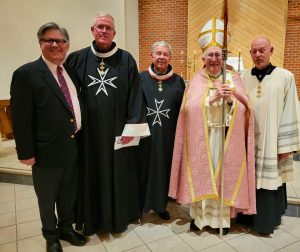 The CT North East Area of the Order of Malta and the Equestrian Order of the Holy Sepulchre of Jerusalem met Sunday, March 30, for Solemn Vespers at St Monica’s Church (St Ambrose Parish), Northford. Archbishop Leonard Blair, emeritus archbishop of Hartford and a member of both Orders presided and preached.
The CT North East Area of the Order of Malta and the Equestrian Order of the Holy Sepulchre of Jerusalem met Sunday, March 30, for Solemn Vespers at St Monica’s Church (St Ambrose Parish), Northford. Archbishop Leonard Blair, emeritus archbishop of Hartford and a member of both Orders presided and preached.